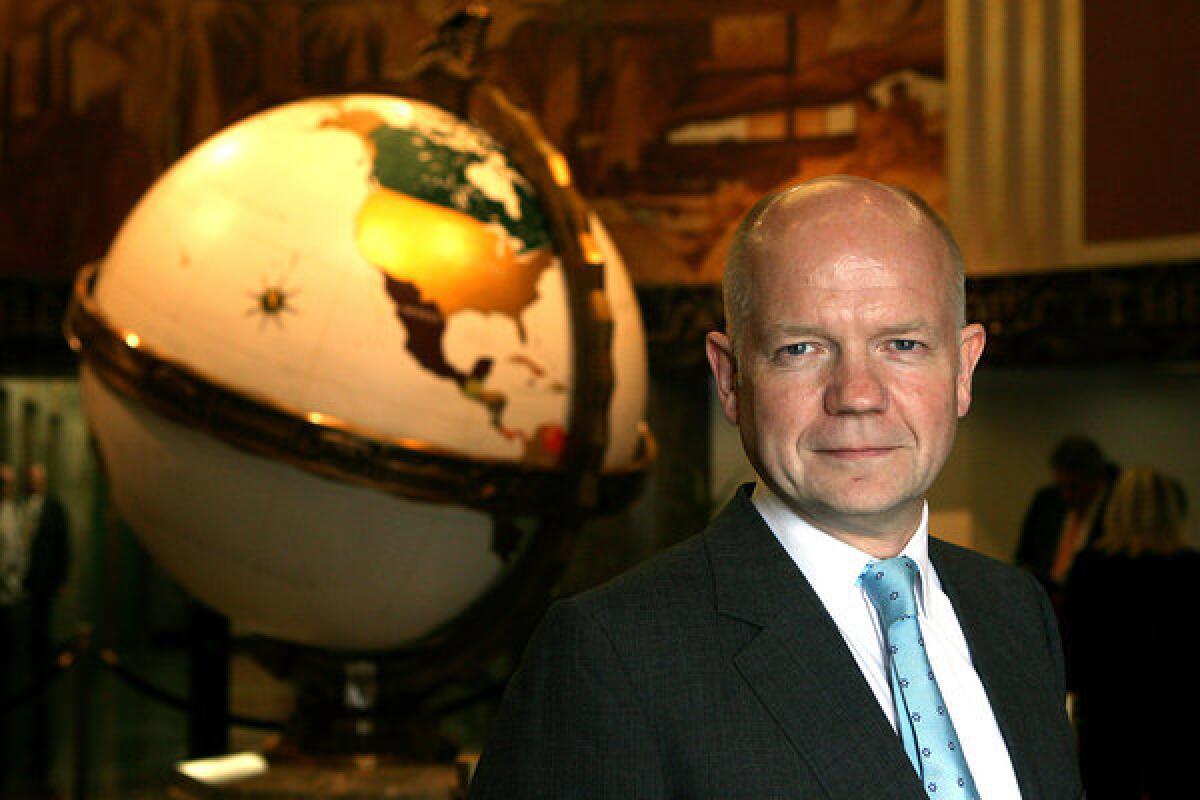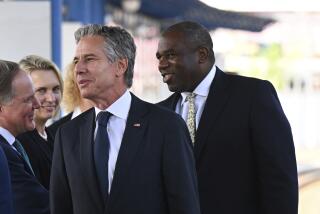Global Voices: Top British diplomat touts UK ‘soft power’

- Share via
Long past the days of empire and the divisive superpower era, Britain is turning a fresh face to the outside world.
In a diplomatic sweep across North America, British Foreign Secretary William Hague has unveiled a reformed and modernized foreign policy, what he terms “new ways of exercising our influence in the world” by recognizing shifting and proliferating centers of power.
Britain is a veto-wielding permanent member of the U.N. Security Council, one of the P5-plus-1 negotiators on Iran’s nuclear programs, a major figure in the 11-nation effort to aid Syrian rebels and a newly engaged, tweet-ready, Facebook-friending diplomatic force in the long-neglected corners of Latin America, Africa and Asia.
Hague describes Britain’s outlook in the post-Cold War era as “rejecting decline” and “letting the rivers of soft power flow.”
Soft power emanates from globally respected institutions, Hague says, like the BBC broadcasts enjoying record listenership, the English classes being taught by the British Council in 50 countries, expansion of the British diplomatic footprint around the world and investment in the creative arts both at home and in the entertainment mecca that is California.
Hague gave a major foreign policy address at the Ronald Reagan Presidential Library in Simi Valley on Tuesday night and pressed his country’s trade and investment opportunities at a luncheon of the Los Angeles World Affairs Council on Wednesday. He also sat down with Times executives, editors and writers to talk about Britain’s foreign policy priorities and challenges.
Question: Do you accept the American conclusion that the Syrian regime has used chemical weapons?
William Hague: Yes. We’re very closely aligned on that, and indeed some of the evidence examined by the United States overlaps with our evidence and the conclusion is the same. There has been use in a localized way but on a number of occasions. We don’t have any evidence of use by the opposition and we would say so if we did. We do need those charged by the U.N. with investigating to have access. There is agreement, including with Russia, that the U.N. should be allowed to examine the sites of concern. But the regime [of Syrian President Bashar Assad] hasn’t given that cooperation.
Q: How do you define direct assistance to the Syrian rebels?
H: That is a term of the U.S. government, not one used by the UK. We give practical support that saves lives to the national coalition, not to any other opposition groups, and what that amounts to is body armor, vehicles that are ballistics-protected, communications equipment, water-purification equipment and a lot of humanitarian assistance.... We have not provided lethal aid.
Q: How concerned are you about the recent gains the Syrian government has made on the ground? Is it your assessment that they are sustainable?
H: We are concerned because it is making the Geneva II conference idea that [U.S. Secretary of State] John Kerry agreed with the Russians much harder. If the regime believes that they are tactically secure for a time, even though sitting atop a collapsing state and economy is not what most of us would regard as secure, they may feel they are immune from overthrow for the time. It’s hard to see them entering into successful negotiations for a transitional government.
Q: Are you satisfied now with the level of coordination among the various rebel groups?
H: Considering the circumstances of the country, Gen. [Salim] Idriss, who is an impressive person whom I’ve met many times, has established a reasonable degree of coordination among the Free Syrian Army. But there are clearly other groups there as well. In parts of Syria, it is more fragmented and we are concerned about foreign fighters going to Syria as part of the growth in extremism and radicalization. To us, that is part of the case for giving practical assistance to the national coalition. Otherwise we would be leaving the people of Syria with a murderous regime and extremist groups to choose from.
Q: You said that you’re expanding diplomacy around the world and reversing your retreat from Latin America. Where have you reopened?
H: We just opened an embassy in Haiti for the first time since the 1960s. And in El Salvador last year, and Paraguay is coming up. In the 1990s and 2000s, four British embassies were closed in Latin America. That sent a signal that Britain is pulling back from Latin America. It’s not just about embassies, valuable as they are, it’s about what goes with the embassies -- the trade and missions, the presence of British Council, visits by ministers and businesses. So the embassies are a guise to that activity, and not just in Latin America. We’ve just become one of only three European countries with an embassy in all 10 ASEAN [Assn. of Southeast Asian Nations] states. We’re in particular opening up in parts of Africa. Proudly we opened up in Mogadishu, raising the very flag that was lowered 22 years ago. We’re the first European embassy back in Somalia. And we play a leading role in addressing the problems of Somalia. We are in Mali, in Liberia and Cote D’Ivoire, we’re opening in Madagascar. We just opened our first-ever embassy in Kyrgyzstan. No other European country – perhaps no other Western country – is doing this. I strongly believe we’ve entered the networked world in diplomacy and that there are more centers of decision-making in the world now than ever before.
Q: Your trip here has a very strong business focus. With the impending referendum on Britain’s EU involvement, are you encountering any confusion or concern among potential investors as to what kind of Britain they would be investing in, an island country or part of a united Europe?
H: The best answer to that is how people vote with their feet. In the past year we’ve had a record year for direct foreign investment. We lead the European Union by a long way on this. The numbers don’t tell of a problem in that regard. When people do raise it, we explain that we think it’s right to have a referendum in a way where we lead the debate, we shape the debate. We think it’s better to name the time for it and set out to give people a choice, not between the status quo now or leaving the EU, but between an improved relationship within the EU or leaving. We will hold a referendum by the end of 2017 because we want time to show that Europe can do better in terms of being more competitive and more flexible.
Q: How should we view the UK – willing to be a net exporter of commerce and jobs to these Southern California industries that have gone through quite a bit? How should we view you, as friend or foe?
H: We shouldn’t say net importers or exporters, we should talk about the enlarged total, which is called free trade. The idea of a transatlantic business partnership is a great idea. Economists’ estimates vary enormously but they suggest the EU economy will benefit by 85 billion pounds [$131 billion] and the U.S. economy by 100 billion pounds [$154 billion] a year from freer trade. So I don’t think we should think about it in terms of the job is gained in Los Angeles and lost in the UK, or vice versa. We can enlarge the total.
Q: How much stress on our relations has this PRISM program [clandestine U.S. National Security Agency electronic surveillance] created?
H: I’m the minister responsible for two of these intelligence agencies. I made my statement to Parliament about the strong legal framework in which we operate, which also the United States operates under. While in some other countries intelligence services exist in order to control the people, in our countries they only exist to protect the freedom of people. The U.S.-UK intelligence cooperation is unique in the world. It is valuable to the national security of both countries and if you’re in government in the U.S. or the UK you wouldn’t want to do for one day without it -- in preventing terrorist attacks, frustrating organized crime, constraining foreign intelligence agencies.
Q: What do you think about the growing conversation among Latin American leaders to either legalize or decriminalize drugs?
H: We’re always willing to listen. But I have to say whenever we’ve debated this in the UK we’ve always come back to the same position, which is that although there are legitimate arguments on both sides, we are not in favor of decriminalizing the most serious categories of drugs because of all the knock-on effects of that.
Q: You mentioned Iran in your list of headaches. What specifically would you be looking for in terms of signals from the new president when he comes into office?
H: We have had some negotiations, several meetings held this year, but those six countries [P5-plus-1] have not yet found an Iranian response to the offer we have made [on uranium enrichment limits] to be a reasonable one. They’ve asked for enormous concessions in return for not solving the problem. Clearly we want to see a more realistic approach to the negotiations and to transparency. The board of the International Atomic Energy Agency has repeatedly asked for access to particular sites and been denied. Transparency to the board of the IAEA would obviously be treated by the world as a positive sign. President-elect [Hassan] Rowhani has spoken about transparency. Of course, the ultimate responsibility for the nuclear program in Iran doesn’t lie with the president but with the supreme leader, so time will tell what Iran’s approach will be.
More to Read
Sign up for Essential California
The most important California stories and recommendations in your inbox every morning.
You may occasionally receive promotional content from the Los Angeles Times.











